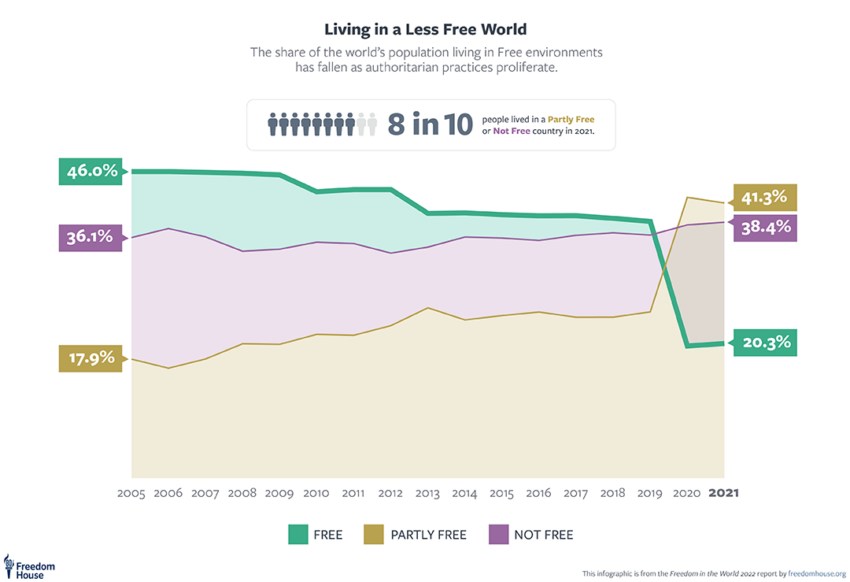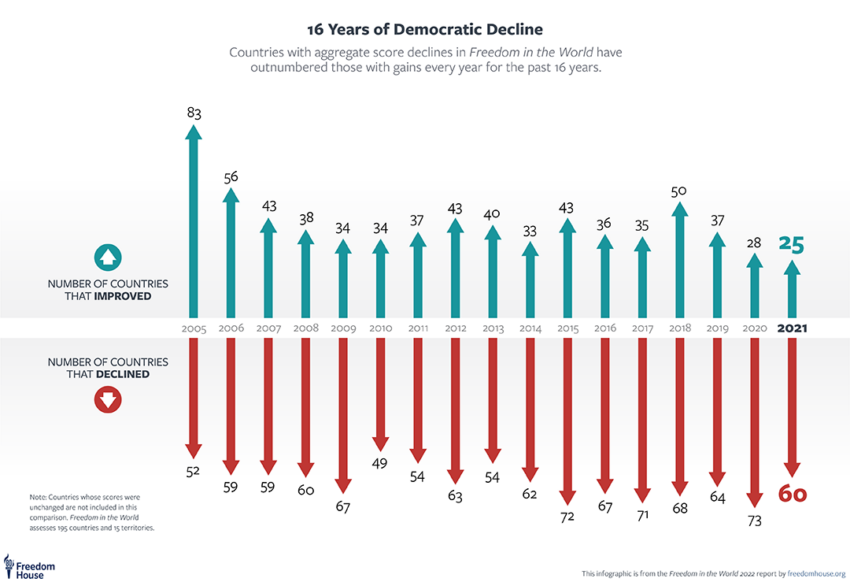Blockchain
At a time when democracy is under siege, the quest for a secure and reliable voting system has never been more urgent. Enter blockchain technology, with the potential to revolutionize the way we vote and protect the democratic process.
But as we delve into the pros and cons of this emerging technology, one must ask: Can blockchain really help secure democracy? Let’s take a look at the opportunities, challenges and real-world examples of implementing blockchain in the election process.
Authoritarianism and the Promise of Blockchain Voting
With authoritarianism on the rise in countries like Brazil, Turkey and, some say, the United States, democracy faces unprecedented challenges. Accurate and transparent voting is crucial to preserving democratic values.
Blockchain technology offers a potential solution for secure and fraud-proof voting. Despite verified results, about 40% of Americans believe the last presidential election was “stolen,” raising questions about the technology’s effectiveness in ensuring electoral confidence.
Not all American voters in 2020 have credited the results of the election, but remote voting still has untapped potential.
The Promise of Blockchain
Blockchain voting guarantees transparency and integrity in the election process. By recording each vote as an encrypted transaction on a decentralized ledger, blockchain ensures that votes are irreversible, traceable and auditable. This prevents manipulation and strengthens the credibility of the process.
In addition, blockchain voting systems can use smart contracts to automate various election tasks such as voter registration, vote counting, and declaration of results, further bolstering trust in the system. In addition, blockchain-based voting systems can enable third-party audits, making the election process even more transparent.
By using decentralized and encrypted ledgers, blockchain significantly reduces the risks of voter fraud and hacking. The decentralized nature of blockchain systems makes it difficult for malicious parties to manipulate the system. Every node in the network verifies transactions, making it nearly impossible for unauthorized access or alteration of data to go unnoticed.
The use of cryptographic signatures can ensure that only eligible voters can vote, preventing potential fraud. In addition, a distributed denial-of-service (DDoS) attack, which is a common threat to traditional voting systems, would be less effective against a decentralized system.
Remote and secure voting options can increase voter turnout by removing geographic barriers and making the process more accessible. Blockchain technology enables secure remote voting from anywhere, potentially benefiting people with disabilities, remote workers, and citizens living abroad.
By streamlining the voting process and reducing reliance on manual procedures, blockchain can also speed up vote counting and result declaration. This can lead to a more efficient election process and even shorter announcement of the results.
The Disadvantages of Blockchain
Blockchain voting is not immune to mistakes and problems. For example, a 51% attack occurs when a single entity or group gains control of more than 50% of the network’s computing power, potentially allowing it to manipulate the ledger. In addition, collusion between network participants can jeopardize the election results.
Coercion, where individuals are forced to vote a certain way, can persist in a blockchain voting system and ruin the legitimacy of the election. New security measures, such as secure cryptographic protocols, may need to be developed to protect against these threats.
Scalability is another challenge for blockchain voting systems. As the number of voters and transactions increases, the capacity of the system can become strained, resulting in slow transaction times and higher costs. Developers must create systems that can handle large amounts of data without compromising performance or security.
Interoperability is another concern, as integrating different blockchain platforms can be tricky. This may prevent widespread adoption of these voting systems. Establishing industry standards and promoting collaboration among blockchain developers can help solve this problem.
Finally, there are numerous regulatory challenges as governments must create extensive regulations and standards to regulate the use of blockchain voting systems, potentially causing delays in implementation. Policymakers must work closely with technology experts to develop legislation that enables innovation while protecting the integrity of elections.
The digital divide may worsen with the adoption of blockchain technology. Rural or economically disadvantaged areas with limited internet access may struggle to participate in elections. In addition, differences in digital literacy may exclude those who lack the skills to navigate digital voting platforms. To address this problem, governments must invest in infrastructure and education initiatives to bridge the digital divide and ensure equal access to blockchain voting systems.

Map courtesy of Freedom House.
Examples from the real world
West Virginia’s 2018 blockchain voting pilot targeted military personnel stationed overseas. The Voatz app made voting easier, and while the pilot showed the ease of blockchain, it also revealed security and scalability issues.
Utah followed suit in 2020 and implemented blockchain voting for its Republican primary. The experiences of these states provide insight into the challenges and opportunities of deploying this technology on a larger scale.
South Korea’s trial of blockchain election systems aims to improve transparency and reduce fraud. A small-scale trial proved successful, but scalability remains a challenge. Greenland (population 56,000) used blockchain in the 2021 elections, showing that there is scope for elections on a smaller scale and areas that need improvement. These international examples further demonstrate the potential benefits and current limitations of blockchain voting.
additional considerations
Blockchain voting systems must ensure the anonymity and privacy of voters. While blockchain transparency is good for vote verification, it raises concerns about voter privacy. Developers must create systems that combine transparency with privacy, ensuring that individual voter information remains hidden. Techniques such as zero-knowledge proofs and homomorphic encryption can help protect voter privacy while maintaining transparency.
The success of this technology depends on public confidence. Citizens need assurance that blockchain voting is secure and accurate. Public education campaigns and transparent audits are essential to build trust in the system and address misconceptions. Involving stakeholders including political parties, election officials and the general public can help build confidence and support for the adoption of this technology.
Implementing such voting systems requires significant investment in infrastructure development, including hardware, software and training for election officials. Governments must weigh these costs against the potential benefits of using blockchain technology. Long-term cost savings, such as lower expenses for paper ballots and polling stations, should also be considered.

Graphics / Freedom House
Harnessing Blockchain’s Potential for Democracy
Blockchain offers a promising solution for securing democracy through transparent, safe and accessible elections. Despite the potential benefits, challenges such as errors, vulnerabilities, scalability, and inequalities must be addressed. Real-life examples demonstrate both the potential and limitations of blockchain voting.
As technology matures and these challenges are addressed, blockchain can help secure democracy worldwide. However, success depends on building trust, ensuring privacy and developing the necessary infrastructure to support the use of this technology. Collaboration between governments, technology providers and other stakeholders is crucial to realize the full potential for strengthening democratic systems.

